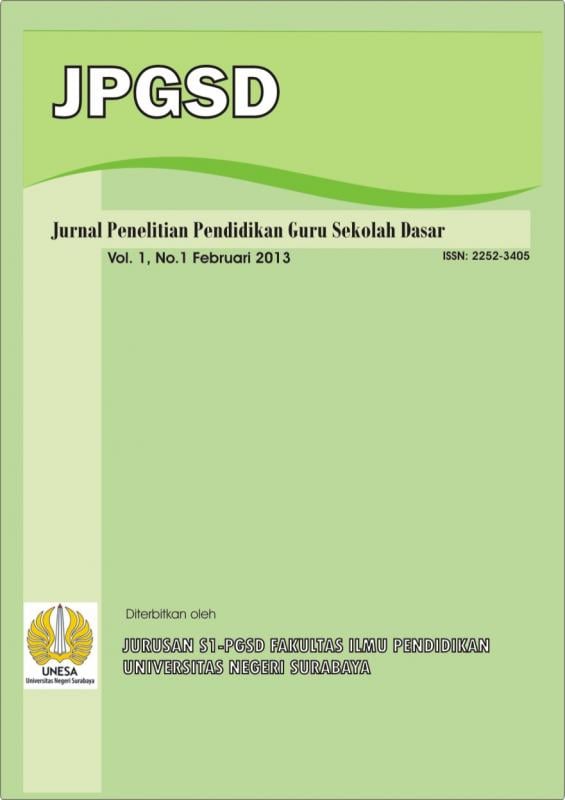PENGEMBANGAN E-MODUL PEMBELAJARAN IPS BERBASIS PENDEKATAN KONSTRUKTIVISME BERINTEGRASI KAHOOT UNTUK SISWA KELAS IV SD
Abstract
Abstrak
Penelitian ini dilatarbelakangi oleh beberapa keterbatasan yang ditemukan dalam pengembangan E-Modul
pada penelitian sebelumnya, di antaranya: (1) belum terdapat E-Modul yang mengusung tokoh spesial
untuk membantu peserta didik menjelajah isi E-Modul, (2) penyajian materi hanya sebatas gambar dan
tulisan saja, hal tersebut kurang sesuai dengan kebutuhan kurikulum merdeka yang lebih optimal
menggunakan konten, (3) materi yang terkandung dalam E-Modul kurang mendukung dalam pembelajaran
berbasis konstruktivisme, (4) latihan soal yang tersedia kurang menunjukkan karakter konstruktivisme. (5)
kegiatan evaluasi pembelajaran yang diterapkan guru masih memakai cara konvensional yang kurang
efisien yaitu hanya melalui tes tulis. Tujuan penelitian ini adalah untuk mengetahui kevalidan dan
kepraktisan E-Modul pembelajaran IPS berbasis pendekatan konstruktivisme berintegrasi kahoot untuk
siswa kelas IV SD. Jenis penelitian ini menggunakan Research and Development (R&D) dengan model 4D
yang terdiri dari 4 tahap yaitu Define, Design, Develop, dan Disseminate. Subjek pada penelitian ini yaitu
siswa kelas IV B SD Negeri DR. Soetomo V Surabaya. E-Modul Pembelajaran IPS Berbasis Pendekatan
Konstruktivisme Berintegrasi Kahoot yang telah dikembangkan dan melalui proses uji validasi, dengan
validasi ahli materi mendapat hasil presentase 96,73% dengan kriteria sangat valid. Sedangkan validasi ahli
media mendapat hasil presentase 82,81% dengan kriteria valid. Dari uji praktikalitas yang telah dilakukan
pada guru dan siswa, dengan hasil presentase yang diperoleh dari guru sebesar 95,45% dengan kriteria
sangat praktis. Sedangkan dari siswa diperoleh hasil presentase sebesar 84,72% dengan kriteria valid.
Dengan demikian dapat disimpulkan bahwa E-Modul yang dikembangkan dapat digunakan sebagai salah
satu bahan ajar yang dapat membantu proses belajar peserta didik dan membantu guru.
Kata Kunci: : E-Modul, Konstruktivisme, Kahoot
Abstract
This research is motivated by several limitations found in previous studies on the development of EModules, including: (1) the absence of E-Modules that incorporate special figures to assist students in
exploring the contents, (2) the limited presentation of materials to only pictures and writing, which does
not align with the requirements of an independent curriculum that optimally utilizes content, (3) the lack of
support for constructivism-based learning in the materials contained within the E-Module, (4) the exercise
questions available do not reflect the characteristics of constructivism, and (5) the learning evaluation
activities implemented by teachers still rely on conventional methods, such as written tests, which are less
efficient. The purpose of this study was to determine the validity and practicality of an E-Module for Social
Science learning, based on the constructivism-integrated Kahoot approach, for fourth-grade elementary
school students. This type of research adopts the Research and Development (R&D) framework, utilizing
the 4D model consisting of four stages: Define, Design, Develop, and Disseminate. The participants in this
study were students from Class IV B at SD Negeri DR. Soetomo V in Surabaya. The developed E-Module,
incorporating the Kahoot Integrated Constructivism Approach-Based Social Studies Learning, underwent
a validation process. The material expert validation yielded a percentage of 96.73%, indicating very high
validity. Meanwhile, the media expert validation obtained a percentage of 82.81%, indicating high validity.
Practicality tests conducted with teachers and students yielded percentages of 95.45% and 84.72%
respectively, both indicating valid criteria. Thus, it can be concluded that the developed E-Module can be
utilized as one of the materials in the teaching and learning process.
Keywords: E-Module, Constructivism, Kahoot
Downloads
 Abstract views: 253
,
Abstract views: 253
, PDF Downloads: 354
PDF Downloads: 354







